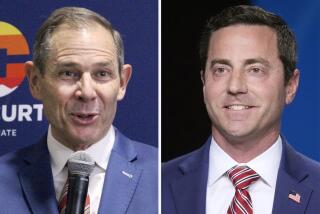Why Is Hatch Running? Few Know
- Share via
WASHINGTON — By any standard, Sen. Orrin G. Hatch (R-Utah) is one of the lions of the Senate. The 65-year-old onetime trial lawyer is chairman of the Judiciary Committee, making him a major force on issues ranging from judicial nominations to reforming the legal system. When Hatch speaks, his colleagues in both parties listen.
But Hatch’s campaign for the GOP presidential nomination has been little more than a political asterisk. He has a minuscule campaign staff. He has spent only minimal time on the stump. And after five months, he still commands only 1% or 2% in the polls, both nationwide and in the key early states of Iowa and New Hampshire.
So why is this man running for president? That question increasingly prompts some head-shaking in Washington.
Admittedly, Hatch isn’t the first senator to launch a longshot bid for the presidency. Sens. Richard G. Lugar (R-Ind.), Tom Harkin (D-Iowa) and Bob Smith (R-N.H.), all have made the run in recent years--and each barely registered in their races.
Marshall Wittmann, political analyst at the conservative Heritage Foundation, said senators frequently seek the presidency because they believe it enhances their standing in Congress and with the public. “It’s difficult to explain [Hatch’s candidacy], other than that he’s getting a national platform for his views,” Wittmann said.
Hatch clearly has relished this opportunity, last week going so far as to suggest that all the GOP contenders get on a bus and conduct a series of ongoing debates in Iowa and New Hampshire.
Still, even some of Hatch’s friends remain mystified by his White House quest. “A lot of us are puzzled by it,” a Western senator said, declining to speak on the record lest he breach senatorial propriety.
Sen. Larry E. Craig (R-Idaho) is less restrained. Asked why he thinks Hatch is running, he cracks: “When you find out, tell me.”
Characteristically, Hatch shrugs off such comments--and remains confident that he is taking the right course. “The whole reason I’m in public service is to give back,” he said recently. “I worry that none of the other Republican candidates can beat [prospective Democratic nominees] Al Gore and Bill Bradley. . . . I’m the only one who appeals to people across the board.”
Indeed, Hatch at times barely can contain his disdain for his GOP rivals. He dismisses Texas Gov. George W. Bush as “an unknown who is unproven.” And he raps Sen. John McCain (R-Ariz.) for touting “a campaign finance reform package that . . . if enacted would emasculate the Republican Party for decades.”
The Utah senator used this week’s televised debate with the other GOP candidates in Arizona to drive home the central premise of his candidacy: Declaring that Bush, the front-runner, needs more experience before becoming president, he invited him to become the vice presidential candidate on a Hatch ticket.
“I should be president, and you should have eight years with me, and, boy, you’ll make a heck of a president after eight years, I’ll tell you,” Hatch said.
During his 23 years in the Senate, Hatch has staked out a position as a “common-sense conservative” and an effective Republican partisan. But he also has fashioned an odd-couple alliance with Sen. Edward M. Kennedy (D-Mass.) on such issues as expanding children’s health benefits and extending the life of the Job Corps.
Indeed, Hatch’s willingness to reach out to Democrats on some social issues has drawn criticism from some far-right Republicans, who complain that he has lost his ideological moorings.
Lacking national name recognition and a solid core of supporters, Hatch’s presidential bid has been hampered by a shortage of money. Federal Election Commission reports showed that as of Sept. 30 he had raised a scant $1.3 million--lowest of all the candidates.
Moreover, an analysis by the nonpartisan Campaign Study Group showed that his fund-raising base remains narrow, with more than one-third of his contributions coming from his home state.
In his campaigning, Hatch has limited himself to a handful of issues--bolstering defense spending, strengthening anti-terrorism measures, cutting taxes, providing educational vouchers for schoolchildren and overhauling Medicare. But there are signs he may be about to step up his efforts.
Aides say he is preparing to unveil proposals on an array of major issues designed to set him apart from other candidates. He made a three-day stop in Los Angeles this week to appear at fund-raisers and hold a news conference.
On Friday, he will be feted at a fund-raiser sponsored by Silicon Valley critics of Microsoft Corp., whose business tactics he has vigorously criticized. Campaign spokesman Jeff Flint said the fund-raiser is not a reward for Hatch’s anti-Microsoft efforts. “He’s not calling in a debt,” Flint said.
Hatch is hedging his bets, running for Senate reelection as he continues his presidential campaign. And he seems to suffer few illusions about his White House hopes. “I believe in miracles,” Hatch told reporters earlier this year. He then deadpanned: “It would probably take that to elect me.”
More to Read
Get the L.A. Times Politics newsletter
Deeply reported insights into legislation, politics and policy from Sacramento, Washington and beyond. In your inbox twice per week.
You may occasionally receive promotional content from the Los Angeles Times.










